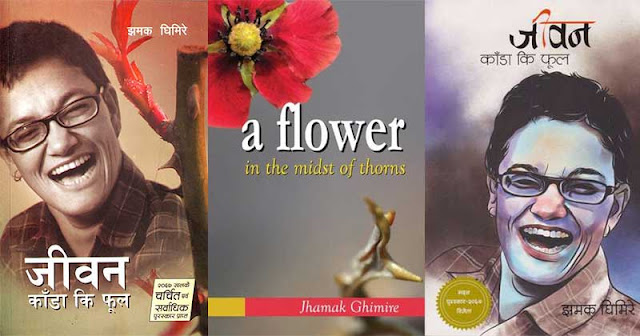MY EXPERIENCE IN BEIRUT-I
 |
| Photo: Beirut tourism board. |
By LB THAPA
My stay in Beirut during 2005-6 was full of
excitement. I had been to Beirut with two obvious intentions. First, to
complete my debut novel…this was all set in my mind. And the second was to do some
freelance writing. My freelance writings were published by one national daily
and a weekly newspaper in Kathmandu.
The last chapter of the novel was penned down
in the early dawn we left Beirut abruptly. The whole night I was writing my
novel. My dropping eyelids would get a sudden lift by the sound of bomb that
Israeli jet planes dropped around the airport, Antilles and Marina. At 4 o'
clock in the morning, the last chapter of the novel was written…I took a sigh
of relief.
The Pandora's Box was opened when Hezbollah
militia seized two Israeli soldiers in July 2006. Israeli troops came upon
heavily with all their might. A bloody war ensued that lasted for about 34
days. The war ravaged the property beyond calculation and killed over 1000
Lebanese. The war left over 100 Israeli troops also killed.
The war was not showing any sign of dying
out. We would rush to the basement to protect from Israeli bombarding, but those
basements were too fragile against the mighty bombs that Israeli jets dropped around
us. Meanwhile, I received a phone call from my brother, who was serving in the
Indian army. He advised me to contact the Indian embassy and get out of Beirut
by a rescue ship, which was dispatched from Mumbai.
But going out in a taxi was full of risk. We
tried but no taxi agreed to take us to the Indian embassy. Looking at our
predicament, Malek Khourey, a Lebanese staff, agreed to drop us nearby the
Beirut port in his car. Our car was passing through burning vehicles and broken
bridges. We could be a soft target of Israeli jet plane, which targeted every
moving object. But thanks god nothing bad happened. We were all safe and sound.
At the Indian embassy we were treated very
nicely. For the first time, we felt safe and protected there. However, there
was not a single Nepali authority to meet with. I visited a contact office of
Nepali counselor, but no one was there to meet. It was disheartening indeed.
The ship remained there until dusk, and left the Beirut port right before
Israel's deadline was over for leaving Beirut.
Before I visited Lebanon, I had heard a lot
about this beautiful country. This had made me to know more about this country.
After having spent hours and hours in the plane, we were closer to Beirut. I
looked down with the intention of seeing Beirut, but I could see nothing but
only waters. Meanwhile, I spotted a long runway; the city was flooded with
bright light. I was bewitched by the lovely bright scene of the town. At the
airport, two of the security officers took me to a chamber for the
interrogation. When they were fully satisfied with my answers, they let me go.
Now I was right in Beirut and free.
Before I traveled to Beirut, I was well aware
of the troubled past of this tiny nation. The country had experienced a bloody
civil war from 1975-1990 where Israel, Syria, and the Palestine Liberation
Organization (PLO) took part in the battle for their vested interest. Israeli
troops invaded over Lebanon with all its strength in 1978 and again in 1982.
Israel withdrew its troops from Lebanon only
in 2000 and Syria in 2005. Hezbollah is known as a terrorist outfit, which is
heavily armed with the most sophisticated light and heavy arms. It has its own
brigades of militias who are always ready to sacrifice their lives to meet
their purposes. Peace has always been illusive in Lebanon. Lebanon is literarily
sitting on an active volcano, which can explode at any moment. Nevertheless, the
most interesting thing about Lebanon is that despite a volatile situation, the
country is making a steady progress.
While staying in Beirut, I managed enough time
to write my debut novel, The Quest of a
Dead Man. Now the book has been published by amazon.com, London. My job was
to take care of the property of one of the richest Lebanese men. He was then
living in London. He would come to Beirut only twice in the year for a few days
stay.
I would get enough time to write my novel. I
would write until 12 midnight and get up at 6am. On my weekly day off, I would
go down to the main city Daura near Antilles, to meet some Nepali folk. I made
many Nepali friends in Beirut. Most of them could speak fluent Arabic. That
inspired me to learn Arabic from them.
Rup Narayan Bhattarai, 41, from Arghakhachi, arrived
in Lebanon a decade ago. He was working in a factory nearby the Beirut sea
port. "My Nepali friends helped me to get a job in a factory within a week
of my arrival from Nepal. This factory manufactures plastic goods. The work is
tough. We have to work under extreme temperature.
And the smell of liquefied plastic is the
most obnoxious. Most of us get 400 to 500 US dollars per month. We have to
manage all our expenses out of that. Saving is very difficult. However, we work
here because situation is not better at home. Had we been able to make a better
living at home, we would have left Lebanon long ago. But for the moment this is
our home" said he with a broad smile across his face.
I did meet some young Nepalese who were
working at a paltry sum of 200 to 300 US dollars per month. They had to work
for 12 hrs daily to claim their salary. Many of the Nepali workers told me that
they get no medical allowances or facilities whatsoever.
Speaking with this scribe, Puran Prasad
Timilsina, 32, from Gorkha, said: "For the first seven months, I did very
hard work in the company and earned some money. But unfortunately I developed a
severe back pain, which made me bad ridden for months. My boss did not pay any
relief amount. He sacked me from the company and employed an Egyptian boy instead.
By the time I recovered from back trouble, I had already finished all the
savings."
My experience in Beirut-II
 |
| Photo: Beirut tourism board. |
I found police patrolling in Beirut very
tight. A pickup van would appear from nowhere and ask for papers. I was duly
instructed for carrying all the papers intact. However, I was surprised to know
that there lived many Nepalese, Indians, Sri Lankans, and Philippinoes without
extending their visa. They roamed as freely as Lebanese, fear none. Long time
stay in the country had made them know every movement of the police.
They knew where and when to go and how to
avoid them. And they also knew what to do if caught. "Sometimes we are caught
but we get things settled after offering them 50 to 100 dollars. The most
important thing is that a passport and visa. If we possess these two documents
then Lebanese Police, in most cases, release with a strict warning and a little
fine" added Timilsina.
Kaji Maharjan, 43, from Tanahun, told me that
there lived over 20,000 Nepalese. Most of them are young girls and women. After
Kaji Maharjan's revelation, I made some efforts to meet Nepali women living in
Beirut. But soon I realized I need help. The simple reason was that over 99
percent Nepali girls in Beirut were domestic helpers. They lived with the
family of their boss. Their boss did not like an unknown person have a chat
with their workers. In one such attempt, I became the victim of an old man's
wrath.
Actually I went alone to meet a Nepali girl nearby
my locality at Rabia, Beirut. I knocked on the door and there appeared an old
man. I greeted him nervously. I just explained to him about my purpose of visiting
his house. First the man listened to me like a wise owl. This encouraged me to go
in detail. After a brief pause, the old man spoke in Arabic that I could not
understand. Then he spoke in French that was too like a steep bouncer to me.
Meanwhile, I saw the Nepali girl coming out
to the door. I immediately recognized her. She must be a Nepali girl. I began
speaking in Nepali with the girl. Upon this the girl began crying profusely. "Dai, malai Nepal pathaidinus!"
(Please brother, send me to Nepal.) The angry old man had lost his temper and caught
me by my collar and began thrashing from all sides. Before it was too late, I
decided to run away from there. My first ambitious foray into meeting a Nepali
girl fizzled out unceremoniously.
I met Hari Godar, 48, from Butwal. He was a
nice man who could speak fluent Arabic and French. He was fond of Lehme bazi (a Lebanese delicacy). I would
always offer him one. Subsequently, he agreed to help me. "Perhaps many
people don't know how many Nepalese domestic helpers have committed suicide in
Lebanon.
I'm dead sure over 100 Nepali girls must have
committed suicide until now. Nepali girls are poorly fed and they are made to
work round the clock. Literarily, they get no rest at all. Some girls have also
become the victim of rape and murder. The police here in Lebanon take almost no
interest whenever a Nepali dies. Their deaths make no difference to anyone
here" blamed Hari Godar.
With the help of Godar, I succeeded in
meeting with Nirmala Tamang, 21, from Baglung. We met her while she was out for
shopping. She said: "A Dalal in Kathmandu told me a different story about
my employment. I simply believed what he said to me. I came to Lebanon with a
bundle of hope, but all of them shattered into pieces as soon as I landed this
country. For one year they paid me no salary at all. I was compelled to get
early in the morning and go to bed only after mid night. My life was a real
hell. One evening I stole my passport and took a taxi for the airport. But
police arrested me at the airport. They called my boss and his wife. They took
me back to the same hell again.
My angry boss and his wife started beating me
almost everyday. Such nasty beatings did stop only last month when my boss'
youngest daughter returned from the US, after completing higher education. Now
she is a teacher in Beirut. If all goes well then next year I will be allowed
to go to my country. I would like to suggest all Nepali girls and women for not
coming to Lebanon" said Tamang in tears.
There are many Nirmala in Lebanon who are
subject to bear hardship and brutality. And there is no one to commiserate with
their miseries. But our government has so far done nothing to ease out the
plight of Nepalese women in Lebanon. In fact the government had banned Nepalese
women to visit Lebanon on working visa. But this ban did not deter avaricious manpower
agencies from sending Nepalese women to Lebanon.
It is utmost necessary to open a Nepali embassy
in Lebanon first, so that victimized Nepali may contact the embassy for the
recourse. Or the embassy may take a legal course on their behalf. A high level
delegation should also be sent to Lebanon to make a thorough study about the
working condition of men and women in Lebanon. Without making a field study,
the government should better not send any Nepali citizens to Lebanon for the
employment.
Thank you very much
for reading this article. I hope you liked this article. I will be glad if you
take little time and make a comment about this article. Your comment is highly
appreciated.
 |
| LB THAPA at the Beirut Port, Lebanon. I was waiting to board a rescue ship sent by the Indian government. Thank you India. |
LEGAL WARNING
All rights reserved. No
articles and photos published in this blog can be reproduced without the prior
written permission of the author. Legal action will be taken immediately if any
articles or photos are reproduced without the author’s knowledge. However,
articles or photos can only be reproduced by duly mentioning the author’s name
and the blog's name (read2bhappy.blogspot.com). The author must be informed by
sending an email. All articles and the photos published in this blog are the
copyright property of LB THAPA









.png)
Comments
Post a Comment